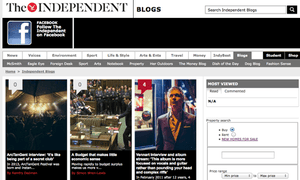1) Why are respected news brands good news for Twitter?
Respected news brands may be good news for Twitter as it may mean that Twitter would be attracting more affluent audiences who have a much higher chance of purchasing any services that Twitter might have to offer. With Twitter greatly struggling recently, if they choose to release subscription based services, these affluent audiences would be highly likely to purchase these while increasing Twitter's revenue. Furthermore, audiences would be able to have a greater understanding of what is going on in the world around them, while using a service that they find rather enjoyable.
2) Why in turn is Twitter good for respected news brands?
Twitter can be considered to greatly support well respected news brands as it is branded as an easy to use interface that allows audiences to view a summarized account of the news, instantly, which is incredibly convenient for society with such busy lives. If audiences went to the direct website of the news brand, it may not show the most important news stories first and even if they do, many of the less important news is completely hidden away. With Twitter, as all the stories can be massively summarized, as well as providing a link to the original news stories, consumers feel more inclined to access the news as it is quicker, more accessible and can be tailored to their specific tastes and preferences.
3) The report suggests that old and new media “are not, in fact, in direct competition, but often work extremely well together to enhance both the media eco-system and the consumer experience”. What evidence do they provide to support this idea? Do you agree with it?
Ultimately, the report suggests that both old media and new media, despite having different means of distributing their information and stories, have similar goals to enhance the news through knowledge, opinion, community and gossip. Through these different forms of enhancements, the audience have a variety of reasons why they would like to access the news. I strongly agree with this concept as both new and old media are different methods of distributing the news but both ways of distributing is from the same news institution. The competition lies in the variety of news institutions as each news brand aim to make their news more popular and more widely read.
4) On page 24/25 of the report, the focus turns to 'gossip' or 'banter'. What example tweets from journalists are used to illustrate this?
Example tweets that journalists use to illustrate 'gossip' or 'banter' are often comedic, sarcastic and have no importance globally or even nationally.
The Independent @Independent • Feb 17
Sewer blocked by large Pooh ind.pn/1fa460H
Daily Mail Celebrity @DailyMailCeleb • Feb 12
Do these pants make Kim Kardashian’s bum
look big?
Excellent: a University has spent £20,000
building a mock pub for students to
investigate why people get drunk
Caitlin Moran @caitlinmoran • Jan 11
The most amazing thing about the story of
President Hollande having an affair is that he
apparently only has one pair of shoes.
5) Do you think the increasing amount of 'gossip' or 'banter' is harming the reputation of news and journalists?
To some extent, it can be considered that these large amounts or 'gossip' and 'banter' are harming these reputable news brands and journalists as these so-called news stories have no relevance to anyone. There are great expectation held on news brands to give educated, and informative news however, with the large amounts of tabloid-esque news stories being distributed by broadsheet news brands, audiences may begin to question the validity of their serious news stories which may lead audiences to lose their trust on such news brands and choose a more reliable news brand. Despite possibly harming the reputation, these 'gossip' news stories included may broaden the audience of the particular news brand, allowing them to target less educated audiences who care hugely about celebrity news and comedic gossip.
6) What does the report say about trust in Twitter and journalists (look at pages 34-39)?
The report greatly focuses on trust and says a build up of audience trust is what causes Twitter and news brands to thrive. As audiences feel that trust is very valuable, they insist for their trusted news brands to be verified by twitter. By doing this, it avoids other accounts impersonating these well respected brands and can also assure new followers and audiences that this news brand is not something to be wary about and there news that they publish will be assured to be legitimate.
7) Finally, do you think new and digital media developments such as Twitter have had a positive or negative impact on traditional newspapers?
I think, without a doubt, digital media developments such as Twitter have had a great negative impact on traditional newspapers. Audiences are now reliant on the convenience and accessibility of news as everything is converged on single devices or single apps. Despite many people having a larger preference towards digital media when accessing their news, their is still a proportion of the public that is part of the digital divide meaning they do not have access to such digital advancements and contrastingly, are reliant on traditional newspapers. Ad news and awareness should be something that everyone is entitled to, I think it is very important that newspapers should be continued to be printed and distributed to those that are part of the digital divide. I think that although many people are completely swept away by the efficiency of new and digital media, many people, every now and again, would enjoy accessing traditional newspapers therefore, newspapers should not be completely discontinued, but should be distributed in smaller amounts.








